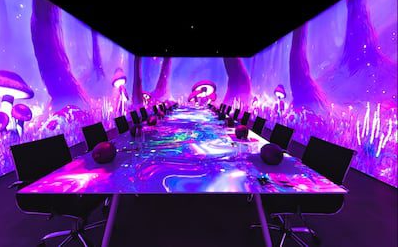BTN News: The question of whether artificial intelligence can outdo humans in creating the perfect pizza is intriguing. Last year, Can Pizza, a popular chain with locations in Barcelona and Madrid, posed this challenge. They pitted Lolo Lorenzo, a master pizzaiolo with over a decade of experience, against a creation designed by ChatGPT, a generative AI program by OpenAI, guided by tech consultant Matthias Schneider. Lorenzo’s pizza, crafted from his extensive expertise, featured ragú, pickled onions and carrots, celery, and Parmesan. In contrast, the AI-inspired pizza combined mozzarella, shiitake mushrooms, sobrasada, Parmesan, goat cheese, pine nuts, honey, and cilantro-lime pesto. While both creations impressed the public, Lorenzo’s traditional approach received a warmer reception, highlighting that AI still has some way to go in mastering culinary arts. Nonetheless, the digital transformation is undeniably making its mark on the hospitality industry.
The Digital Transformation of the HORECA Sector
The HORECA sector, encompassing hotels, restaurants, and cafés, is undergoing a significant technological transformation. In Spain alone, this sector comprises approximately 319,000 establishments and employs 1.7 million people, about 8% of the total workforce. Modernizing and becoming more energy-efficient is a key focus for these businesses. Innovations like next-generation ovens and refrigerators that adjust temperatures based on their contents, sustainable transportation, and AI-powered digital management systems are revolutionizing operations. These systems can predict workload to optimize purchasing and reduce food waste, as well as manage staff schedules to ensure adequate coverage during peak times.
Enhancing Customer Experience with Technology
Technology is not only optimizing operations but also enhancing customer experiences in unique ways. Restaurants and hotels are integrating digital innovations to attract and engage patrons. For instance, Hard Rock Café in Tenerife uses tabletop projections to entertain guests with a miniature animated chef preparing their ordered dishes. In Madrid, the restaurant Sinestesia offers an immersive dining experience where projections on the walls and ceiling transport diners through different worlds, complementing each course crafted by Michelin-starred chef Kike Moya.
Interactive tables are another innovation, replacing traditional surfaces with durable touchscreens that allow diners to browse interactive menus, call waitstaff, and access entertainment like games and news. Even smaller establishments are adopting tablets for order placement, streamlining the process by sending orders directly to the kitchen and displaying the total cost.
The Rise of Robotic Waitstaff
Science fiction’s vision of robotic waitstaff is becoming a reality. Many establishments now use robotic servers, resembling carts with wheels, trays, and screens, to deliver orders and guide customers through the restaurant. Equipped with sensors and AI, these robots navigate obstacles and optimize routes, saving costs and freeing human staff from routine tasks. Although they still require supervision and cannot handle tasks like taking orders or processing payments, advancements in this area are expected.
Smart Technology in Hotels
The hotel industry is experiencing a boom, with Spain being the second most visited country in the world, attracting 85.3 million travelers last year. This year, the number is expected to approach 100 million, with 260 new hotel openings anticipated. Innovations in hotel technology are enhancing guest experiences. Smart features like room access via mobile phones, tablet-controlled room settings, and interactive mirrors that play music, display videos, and offer health tips based on user data are becoming standard in many hotels.
The Futurotel Dreams in Granada is a prime example, showcasing digital innovations such as smart mirrors that provide personalized recommendations, in-room devices that assess skin condition and offer hydration advice, and high-tech toilets that maintain a constant temperature and can analyze urine for health parameters. The Neo group, which manages Futurotel, is expanding these technologies to other locations, emphasizing the importance of offering unique experiences to compete with the rise of vacation rentals.
The Human Touch in the Age of Technology
Despite these advancements, experts like Susana Marín Coe-Archer from EADA Business School and restaurateur Salim Bravo stress the irreplaceable value of human interaction. While technology can significantly enhance the customer experience, the personal connection and attentive service that staff provide remain crucial. Successful establishments will be those that blend technological innovations with traditional, personalized hospitality, ensuring that guests feel valued and recognized.
The Role of Modern Point-of-Sale Systems
The evolution of point-of-sale (POS) systems has also transformed the hospitality industry. Modern POS devices, resembling smartphones, streamline various tasks such as payment processing, tipping, and splitting bills. They also offer features like customer satisfaction surveys, barcode scanning, receipt printing, and digital ticketing via email or WhatsApp. These systems provide detailed activity reports that help business owners make data-driven decisions, improving inventory management and overall efficiency.
In conclusion, while AI and digital innovations are revolutionizing the HORECA sector, the essence of hospitality lies in balancing technology with the irreplaceable human touch. The ongoing challenge for businesses will be to integrate these advancements seamlessly while maintaining the warmth and personal connection that define exceptional service.


